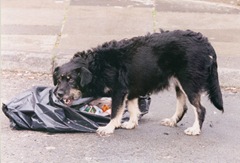Clean Neighbourhoods Bill
 “Low-level environmental crime” such as littering, dog fouling, graffiti, noise and unwanted behaviour in back alleys is targeted in the Clean Neighbourhoods Bill, which passed its second stage on 30 June.
“Low-level environmental crime” such as littering, dog fouling, graffiti, noise and unwanted behaviour in back alleys is targeted in the Clean Neighbourhoods Bill, which passed its second stage on 30 June.
Street litter control notices could soon be issued to businesses – for example street vendors – to force them to clean up after themselves. Owners of land that is defaced with litter could also face litter clearing notices and anyone who fails to provide their name and address could receive a fine of up to £1,000, if the Bill is passed.
The money spent by councils on fishing shopping trolleys out of rivers will become the financial responsibility of the shop from which the trolley was stolen.
The Bill will only allow charitable, religious and political groups to distribute flyers, handouts and pamphlets because these can end up as litter, especially if they are left under windscreen wipers.
Environment Minister Edwin Poots told the Assembly that when the offences contained in the Bill are looked at in isolation they may seem “trivial”, but collectively they are real problems.
The Bill is based on the English and Welsh Act of the same name that was implemented in 2005. Its aims are to give district councils additional powers to deal with waste, reduce anti-social behaviour and cut the “massive” street cleaning costs councils currently have to pay. Importantly, district councils will have the power to enforce fixed penalty notices for most offences and the revenue from these will return to local authorities. It is for this reason the environment department predicts that the Bill will be cost-neutral.
According to Poots, “a staggering £34 million” was spent on street cleansing in Northern Ireland last year. That amounts to almost £100,000 every day that could be spent on other important council services, he said.
In addition, if a case goes to court under the 2003 Pollution Prevention and Control Regulations Act, the maximum fine for a summary conviction (e.g. failing to have a permit to operate an installation or mobile plant) will increase from £30,000 to £50,000.
An addition to the 1993 Roads (Northern Ireland) Order would give councils the power to make a gating order to restrict public access to a road. This order is currently granted by the Roads Service. The council will only be able to issue the gating order with permission from the DRD and if crime and antisocial behaviour is affecting businesses and residents on the road.
At the moment, residents have to approach the Roads Service for a gating order. They also have to pay approximately £3,000 for the gates, plus the costs of locks, keys, third party liability insurance (to a minimum value of £5 million), and maintenance. Councils will now take on this responsibility.
Two new vehicle offences have been created. People who leave two or more cars parked on the road for sale or those who repair a vehicle on the road as part of a business will be prosecuted. The Bill will also give district councils the power to remove abandoned cars from the streets immediately rather than putting a notice on them first.
Welcoming this development the UUP’s Roy Beggs Junior said that in his experience “when it became known that the statutory authorities were about to lift a car, it was deliberately set on fire in the middle of a residential area.”
Fixed penalty notices will be given to graffiti and fly-posting offenders and council officers will serve defacement removal notices in respect of these offences. The Bill will also make it an offence to sell spray paints to children.
Patsy McGlone urged the committee to be careful when dealing with the removal of racist graffiti saying: “It would be extremely perverse if, as a consequence of the legislation, people could be held liable for the removal of graffiti that was designed to be deliberately antagonistic towards them.”
Irresponsible dog ownership continues to be a problem in Northern Ireland therefore the Bill will allow for councils to issue fixed penalty notices for dog fouling, ban dogs from designated areas, require dogs to be kept on a lead, and restrict the number of dogs that can be walked by one person.





